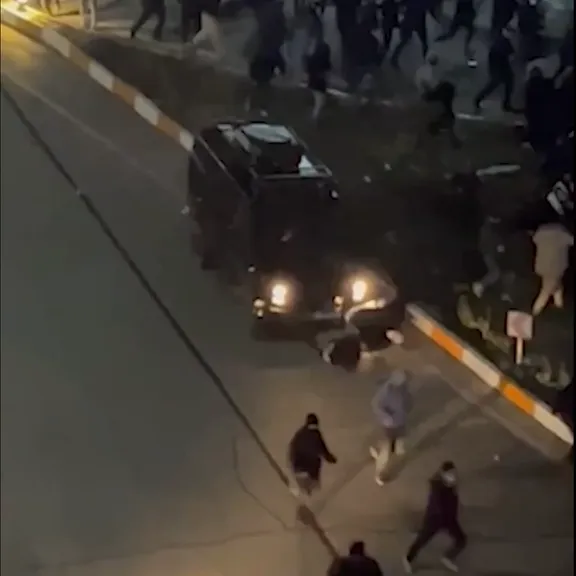Many of those affected have voiced frustration over long delays and unclear procedures, with some students staging protests outside the German consulate in Tehran to demand action on their visa applications.
On Sunday, a group of young Iranians gathered in front of the consulate to protest the embassy’s refusal to process applications for bachelor’s, conditional master’s and college programs.
"This situation is completely unfair. The embassy should not treat us differently from those in higher programs when we have already paid tuition, insurance, and even rent," one protester told Iran International.
TLScontact, the external service provider that collects visa applications and biometric data on behalf of the German embassy, has also faced criticism from applicants who say their repeated calls and visits have gone unanswered.
“In the past two weeks, we have repeatedly contacted TLS, and in recent days we again protested both in front of the consulate and TLS, but no one is responding,” the protestor said.
On June 16, the German embassy announced that it had temporarily closed due to the circumstances created by the war between Israel and Iran and urged visitors to refrain from going to the embassy or its legal-consular section.
“Appointments already issued have been cancelled. The affected applicants will receive an email, and a new appointment will be automatically scheduled for a later date,” it said in a statement.
"The processing of pending visa procedures and the acceptance of new applications are taking place in accordance with current capacities," Germany's Federal Foreign told Iran International in response to an inquiry.
"The Federal Foreign Office aims to expand operations depending on further developments and the personnel resources available," it added.
Separation and forced return
An Iranian man living in Germany told Iran International that before the war began, he had completed the paperwork to obtain an interview appointment for his teenage son’s family-reunion visa.
But since the war broke out, the process has been suspended, and as of November 2025, he has not been able to register for an appointment.
He added that separation from family, uncertainty, and the unstable situation in Iran have negatively affected his son’s mental health.
The “Family Reunion” section of the German embassy’s website says the processing of visa applications for those who had already submitted their documents remains suspended.
It also says that from November 11, appointments for Iranian nationals already on the waiting list for family-reunion visas “will be scheduled depending on available capacity.”
According to the notice, it is not possible to register for new appointments or join the waiting list.
According to those who spoke to Iran International, the separation of families—spouses and children unsure when they will reunite—has imposed a heavy psychological burden.
An Iranian living in Germany said his friend, who migrated to Germany as a nurse on a work visa and has been apart from her husband and six-year-old child for more than a year, was in the final stages of securing their visas when the process was halted due to the war. Now, the future for this family of three remains uncertain.
An Iranian woman living in southern Germany also told Iran International that she witnessed her friend’s forced return to Iran.
She said the woman, a student at the University of Erlangen in northern Bavaria, southern Germany, was forced to abandon her studies and return to Iran after her husband was unable to obtain a visa.
She added that the embassy returned her husband’s passport without even stamping it as rejected.
More than 550 Iranian figures—including political activists, journalists, human rights defenders and those who suffered eye injuries during the nationwide 2022 protests—sent a letter to the German federal government, calling for the immediate resumption of visa processing for political, civil, and labor activists, journalists and other at-risk professions.
According to the 2025 Henley Passport Index on the world’s strongest and weakest passports, among 199 passports, only 13 countries rank below Iran.
In August, the state-run IRNA news agency reported that the closure of several embassies during the 12-day war left about 3,000 to 4,000 Iranian passports caught in visa processing. The report said many applicants, especially students and athletes, were unable to leave the country.














